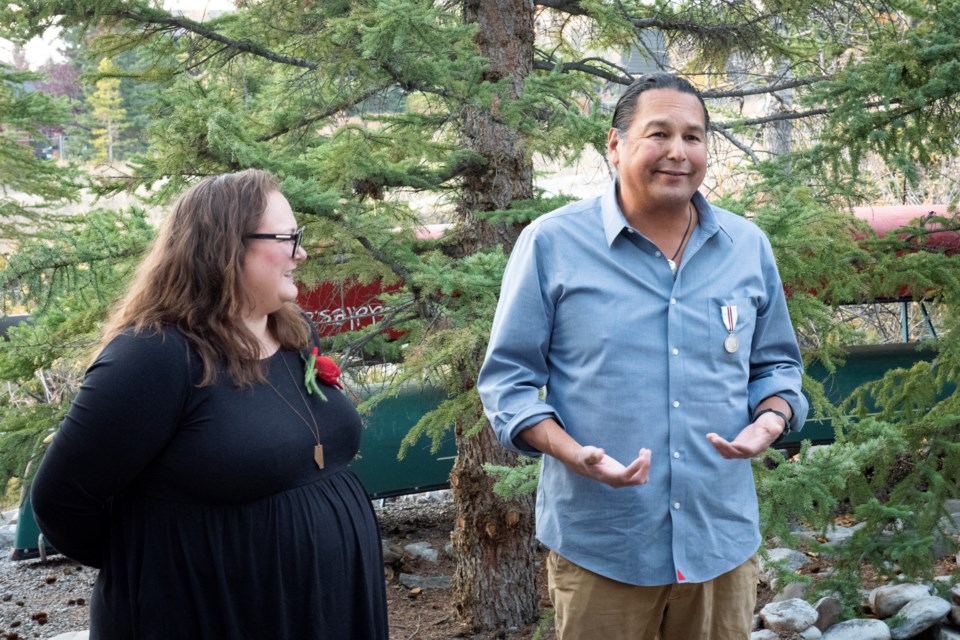STONEY NAKODA – Not 24 hours after Morley Community School principal Jeff Horvath was awarded the Queen Elizabeth II Platinum Jubilee Medal in a quiet ceremony in his backyard, he was back to work the next day, on a mission to fill a student’s belly who forgot their lunch.
“This is just part of what being a principal looks like sometimes,” Horvath said with a laugh, pulling over his vehicle on the way to Subway to safely talk to Great West Media in a phone interview.
Horvath, of Ojibways of Onigaming First Nation in Ontario, was awarded the medal Oct. 19 for his 24 years as a dedicated educator, making significant contributions to the schools he has worked in and the communities which they serve.
He has been principal at the Morley school since 2021 and previously taught there from 2001 to 2007. He has also worked with Canadian Rockies Public Schools and prior to his return to the school in Morley, was principal at Manyhorses High School under the Tsuut’ina Board of Education.
At the core of Horvath’s approach to providing a good education is creating an atmosphere for students to thrive and feel empowered, starting with the simple gesture of greeting them with a smile every morning.
Whether it’s -20 Celsius or colder, without fail, Horvath bundles up to greet young pupils of the Morley Community School with ‘Âba wathtech’ [meaning ‘Good day’ in Stoney] or ‘Good morning’ as they hop off the bus to start the day.
“Since becoming an educator, I’ve always had this image of little Indigenous kids getting off the school bus, coming into school with love, hope and excitement. I try to make them feel welcome because it is their school and the community has entrusted all of us with serving their students,” he said. “I want to be part of that energy; helping to provide programs and helping students build relationships, all towards achieving a good life.
“That’s my ultimate goal.”
The Jubilee Medal, he said, is especially meaningful for his family, who made the decision to move to Alberta from Ontario in 1984.
What was a hard life growing up in Toronto, plagued by addiction issues, violence and poverty, took a hard right turn at the prospect of a new beginning when he moved to Calgary with his mother, father and two brothers.
“My dad got transferred for work and my mother – a residential school survivor – began her healing journey and went back to school to get her high-school education. She later ended up going to the University of Calgary to get a degree in English literature and became a teacher,” said Horvath.
“This award is significant for me and my family because Alberta has really changed our lives for the positive. We’re grateful to be alive and thriving. Our lives have really improved by being in Alberta and so I’m grateful to the province and that makes this award even more special to me.”
When asked if he had any mixed feelings as an Indigenous person toward receiving the award, which is tied to the British monarchy that signed the treaties, Horvath said one can be grateful and critical at the same time.
“I originate from Treaty 3 and I reside in Treaty 7,” he said. “First Nations have a very special relationship with the Crown. It’s not always great, but it is special.
“In regard to the monarchy, I have positive feelings; respectful feelings. I’m aware of the legacy of the poor relationship and the poor treatment, but at this stage we’re in, I feel we’re moving forward.”
A strong believer in democracy, Horvath also ran as a candidate for the NDP in 2004, 2008 and 2011 in what was formerly known as the Wild Rose federal electoral district now encompassed mostly by Banff-Airdrie since the 2015 election.
“I just wanted to try and make our communities, our country, our world, a better place,” said Horvath, adding he was well aware of the challenge of running as an NDP candidate in a rural Alberta riding.
“There were some very stern-looking ranchers who would come up to me after our forums and say ‘I really like you … I don’t like your party and you won’t get my vote, but I like you,’” he said with a laugh.
“I knew I was often going to get slaughtered, but that was OK. I wanted to provide an option for people to be a part of democracy.”
In 2004, Horvath finished third with 8.5 per cent of the vote. He finished a distant fourth with 5.7 per cent of the vote in 2008, and, in 2011, he came third again with 11.29 per cent.
At this point in his life, Horvath said politics has taken the back seat. He is focusing on making change through land-based learning programs at Morley Community School and through his board positions at Spirit North in Canmore and Outward Bound Canada, based in Toronto.
He is also busy pursuing a doctoral degree at the University of Calgary, where he is living his research with his focus of study being First Nations people who are principals in First Nations schools.
“I’m still focused on trying to work with youth and I’m not able to dedicate much time to getting into the political sphere right now, but who knows what the future holds?” said Horvath. “Never say never.”
The Local Journalism Initiative is funded by the Government of Canada. The position covers Îyârhe (Stoney) Nakoda First Nation and Kananaskis Country.




